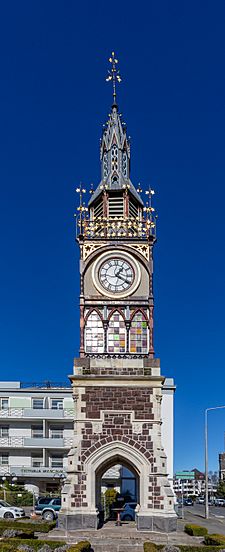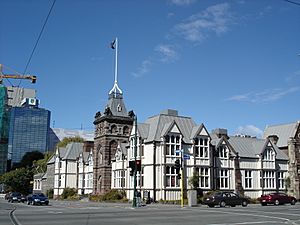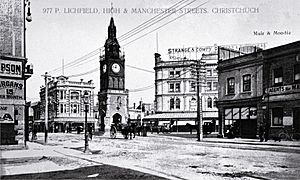Victoria Clock Tower facts for kids
Quick facts for kids Victoria Clock Tower |
|
|---|---|

Victoria Clock Tower, in front of Victoria Mansions, in August 2019
|
|
| Location | Victoria Street, Christchurch Central City |
| Built | 1897 |
| Built for | Queen Victoria's Diamond Jubilee |
| Rebuilt | 1930 |
| Restored | 2003–2004 |
| Architect | Benjamin Mountfort |
| Governing body | Christchurch City Council |
| Official name: Victoria Clock Tower | |
| Designated | 2 April 1985 |
| Reference no. | 3670 |
| Lua error in Module:Location_map at line 420: attempt to index field 'wikibase' (a nil value). | |
The Victoria Clock Tower, also known as the Diamond Jubilee Clock Tower, is a special old clock tower in Christchurch, New Zealand. It was designed by a famous architect named Benjamin Mountfort. This tower is so important that it's officially listed as a "Historic Place – Category I" by Heritage New Zealand.
Contents
History of the Victoria Clock Tower
First Home: Provincial Council Buildings

The architect, Benjamin Mountfort, designed the clock tower around 1858. He planned for it to sit on top of the first wooden part of the Canterbury Provincial Council Buildings. The iron tower and clock were made in Coventry, England. They arrived in New Zealand in December 1860 in 147 boxes.
However, people soon realized that the wooden building was not strong enough. It could not hold the heavy weight of the tower. So, the clock was instead put inside the stone tower of the Provincial Council Buildings. This building was on Armagh Street.
Even though you couldn't see the clock face, its chimes could be heard up to 2 miles away. The clock had some damage from its long sea journey. It only stayed in that tower for a short time. The iron tower itself stood in the courtyard of the Provincial Council Buildings for several years.
In 1876, the way New Zealand was governed changed. The clock tower then became the property of the government. Later, it was given to the Christchurch City Council.
Moving to a New Spot: High Street Intersection
The clock tower was stored in a council yard for 30 years. Then, people decided to use it for a special monument. This monument would celebrate Queen Victoria's Diamond Jubilee in 1897. This event marked 60 years of her being queen.
A competition was held to design a stone base for the tower. A local architecture company called Strouts and Ballantyne won. The clock was sent back to the United Kingdom to be fixed up. New chimes were also added to it.
In 1897, the tower was put on its new stone base. It stood at the busy crossing of Manchester Street, Lichfield Streets, and High Streets. It stayed there until 1930. The tower was then moved because it was causing problems for traffic. The council in Hamilton tried to buy the clock tower, but they were not successful.
Current Home: Victoria and Montreal Streets
In 1930, the clock tower was moved to where it stands today. This spot is a special reserve at the crossing of Victoria and Montreal Streets. The clock itself was also replaced at this time.
The tower was repaired in 1930 as part of its move. More repairs were done in 1978. This was a community project paid for by local businesses. A bigger renovation happened in 2003–2004. This work made the tower stronger against earthquakes. Steel braces were added to the middle part of the tower. Rods were put inside the stone work. These repairs cost NZ$295,000.
Earthquake Damage and Repair
The Victoria Clock Tower was badly damaged in the 2011 Christchurch earthquake on February 22, 2011. The clock stopped at 12:51, showing the exact time the earthquake hit.
In July 2012, the Christchurch City Councillors agreed to pay over NZ$700,000 for repairs. Most of this cost was covered by insurance. Stones in the tower's columns and arches were loose or had fallen out. The spike at the very top needed fixing. The clock itself also needed to be restored. However, some people thought it would be good to leave one clock face stopped at 12:51. This would be a reminder of the earthquake.
The Christchurch City Council started fixing the historic clock tower in March 2013. On October 22, 2013, the Mayor of Christchurch, Lianne Dalziel, officially showed off the newly repaired tower. A time capsule was also placed at the site for people in the future to find.
The repair work was done very carefully. Each of the tower's legs was taken apart. A new strong concrete structure was built inside them. The tower's base was also made stronger. The original stones were cut and put back in the same places. The spire (the pointy top) of the clock tower was straightened, strengthened, and put back.
Workers also moved an underground water source (an artesian well) that was found under the tower. This moved the water away from Montreal Street. The original clock parts were also carefully cleaned and fixed while the tower was being repaired.
 | George Robert Carruthers |
 | Patricia Bath |
 | Jan Ernst Matzeliger |
 | Alexander Miles |


